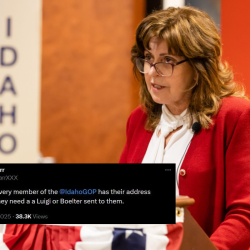By the Idaho Freedom Caucus. Originally published on Substack.
No government ever voluntarily reduces itself in size. Government programs, once launched, never disappear. Actually, a government bureau is the nearest thing to eternal life we’ll ever see on this earth!
Ronald Reagan
Last week, the Senate killed S1445, the Health and Welfare Appropriations bill that funded the Summer EBT program. Liberals have taken to social media to criticize conservatives, calling them cruel and heartless for voting against funding summer food aid for hungry kids.
As usual, the devil is in the details. Let’s dive in:
What is the Summer Electronic Benefits Transfer (EBT) Program?
Remember when the federal and state governments closed schools and businesses during the COVID-19 pandemic? The government responded by offering Pandemic EBT, which provided eligible school-age children with temporary emergency nutrition benefits loaded on EBT cards for purchasing food. Initially designed as a temporary measure to support families during the pandemic, it is now being transitioned into a permanent program, with attempts to entice states into adopting it.
In 2023, the Consolidated Appropriations Act, a $1.7 trillion omnibus spending bill, was passed to fund the U.S. federal government for the fiscal year. It covered various domestic and foreign policy priorities, including support for Ukraine, defense spending, and aid for regions impacted by natural disasters. Also tucked in was the creation of the Summer EBT Program, set to become permanent nationwide starting in 2024. This program provides preloaded cards to eligible families, enabling them to buy groceries, with each eligible school-age child receiving $40 per month.
Who is eligible?
Additionally, the USDA changed the Community Eligibility Provision (CEP) by lowering the minimum identified student percentage from 40% to 25%. This means that if at least 25% of students in a school qualify for a taxpayer-funded school meal, all enrolled students are eligible to receive one.
While this approach may seem beneficial at first glance, it poses several challenges upon closer examination. Suppose only 25% of students in a school qualify for free lunch. In that case, the entire student body suddenly gains access to this benefit, extending it far beyond the initial target group of genuinely needy families. Essentially, every child in such a school receives summer benefits regardless of their family’s financial situation.
The idea of helping specific people in need seems to be forgotten. It’s been replaced by a broad approach that might unintentionally benefit those who don’t need it.
Is there accountability?
Additionally, the Summer EBT program lacks stringent verification rules. Agencies only randomly check 3% of applications, and there are minimal consequences for cheating. If a student is found to be ineligible for benefits, they simply stop receiving them in the future.
The Summer EBT program seems to be heading down the same problematic path as the Pandemic EBT program, with concerns over poor management and loopholes. It appears that the Biden administration and Washington officials are actively promoting this outcome, evidenced by frequent rule changes and guidance from the USDA that weaken fraud protections and expand programs.
What states have opted out?
Despite the push to expand significantly this welfare program, 13 states are saying “NO” to increased federal dependency: Alaska, Wyoming, South Dakota, Iowa, Oklahoma, Texas, Louisiana, Mississippi, Alabama, Georgia, South Carolina, Florida, and now, Idaho.

Are there other options?
It’s worth noting that summer food programs are already available with zero income requirements. Some children who would benefit from the new Summer EBT program already receive food stamps, a program that received a 27% increase just over a year ago.
We shouldn’t take a temporary government program and make it permanent, which once again sets Idaho up to be held hostage by the Federal government through another welfare program that we can’t control. And without income verification in many schools, taxpayers may end up footing the bill for lunches of families with incomes potentially reaching six figures.
The Senate’s rejection of this program protects Idaho taxpayers from more federal overreach. We refuse to surrender to programs that erode our state’s autonomy and self-reliance.












